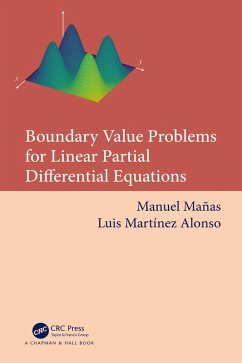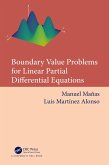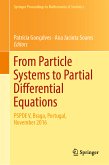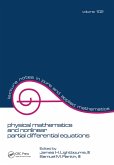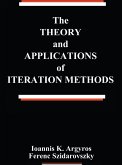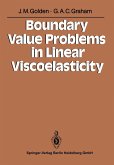Manuel Mañas, Luis Martínez Alonso
Boundary Value Problems for Linear Partial Differential Equations (eBook, PDF)
94,95 €
94,95 €
inkl. MwSt.
Sofort per Download lieferbar

47 °P sammeln
94,95 €
Als Download kaufen

94,95 €
inkl. MwSt.
Sofort per Download lieferbar

47 °P sammeln
Jetzt verschenken
Alle Infos zum eBook verschenken
94,95 €
inkl. MwSt.
Sofort per Download lieferbar
Alle Infos zum eBook verschenken

47 °P sammeln
Manuel Mañas, Luis Martínez Alonso
Boundary Value Problems for Linear Partial Differential Equations (eBook, PDF)
- Format: PDF
- Merkliste
- Auf die Merkliste
- Bewerten Bewerten
- Teilen
- Produkt teilen
- Produkterinnerung
- Produkterinnerung

Bitte loggen Sie sich zunächst in Ihr Kundenkonto ein oder registrieren Sie sich bei
bücher.de, um das eBook-Abo tolino select nutzen zu können.
Hier können Sie sich einloggen
Hier können Sie sich einloggen
Sie sind bereits eingeloggt. Klicken Sie auf 2. tolino select Abo, um fortzufahren.

Bitte loggen Sie sich zunächst in Ihr Kundenkonto ein oder registrieren Sie sich bei bücher.de, um das eBook-Abo tolino select nutzen zu können.
This book provides students with the opportunity to understand and exercise the benefits of Boundary value problems and initial value problems, equipping them with realistic, practical tools to study solvable linear models of electromagnetism, fluid dynamics, geophysics, optics, thermodynamics and specifically, quantum mechanics.
- Geräte: PC
- mit Kopierschutz
- eBook Hilfe
Andere Kunden interessierten sich auch für
![Boundary Value Problems for Linear Partial Differential Equations (eBook, ePUB) Boundary Value Problems for Linear Partial Differential Equations (eBook, ePUB)]() Manuel MañasBoundary Value Problems for Linear Partial Differential Equations (eBook, ePUB)94,95 €
Manuel MañasBoundary Value Problems for Linear Partial Differential Equations (eBook, ePUB)94,95 €![From Particle Systems to Partial Differential Equations (eBook, PDF) From Particle Systems to Partial Differential Equations (eBook, PDF)]() From Particle Systems to Partial Differential Equations (eBook, PDF)73,95 €
From Particle Systems to Partial Differential Equations (eBook, PDF)73,95 €![Physical Mathematics and Nonlinear Partial Differential Equations (eBook, PDF) Physical Mathematics and Nonlinear Partial Differential Equations (eBook, PDF)]() James H. LightbournePhysical Mathematics and Nonlinear Partial Differential Equations (eBook, PDF)231,95 €
James H. LightbournePhysical Mathematics and Nonlinear Partial Differential Equations (eBook, PDF)231,95 €![Ordinary Differential Equations (eBook, PDF) Ordinary Differential Equations (eBook, PDF)]() Raza Tahir-KheliOrdinary Differential Equations (eBook, PDF)105,95 €
Raza Tahir-KheliOrdinary Differential Equations (eBook, PDF)105,95 €![Mathematical Methods for Physics (eBook, PDF) Mathematical Methods for Physics (eBook, PDF)]() H. W. WyldMathematical Methods for Physics (eBook, PDF)52,95 €
H. W. WyldMathematical Methods for Physics (eBook, PDF)52,95 €![The Theory and Applications of Iteration Methods (eBook, PDF) The Theory and Applications of Iteration Methods (eBook, PDF)]() Ioannis K. ArgyrosThe Theory and Applications of Iteration Methods (eBook, PDF)92,95 €
Ioannis K. ArgyrosThe Theory and Applications of Iteration Methods (eBook, PDF)92,95 €![Boundary Value Problems in Linear Viscoelasticity (eBook, PDF) Boundary Value Problems in Linear Viscoelasticity (eBook, PDF)]() John M. GoldenBoundary Value Problems in Linear Viscoelasticity (eBook, PDF)40,95 €
John M. GoldenBoundary Value Problems in Linear Viscoelasticity (eBook, PDF)40,95 €-
-
-
This book provides students with the opportunity to understand and exercise the benefits of Boundary value problems and initial value problems, equipping them with realistic, practical tools to study solvable linear models of electromagnetism, fluid dynamics, geophysics, optics, thermodynamics and specifically, quantum mechanics.
Dieser Download kann aus rechtlichen Gründen nur mit Rechnungsadresse in A, B, BG, CY, CZ, D, DK, EW, E, FIN, F, GR, HR, H, IRL, I, LT, L, LR, M, NL, PL, P, R, S, SLO, SK ausgeliefert werden.
Produktdetails
- Produktdetails
- Verlag: Taylor & Francis eBooks
- Seitenzahl: 452
- Erscheinungstermin: 12. Juli 2024
- Englisch
- ISBN-13: 9781040026427
- Artikelnr.: 72272022
- Verlag: Taylor & Francis eBooks
- Seitenzahl: 452
- Erscheinungstermin: 12. Juli 2024
- Englisch
- ISBN-13: 9781040026427
- Artikelnr.: 72272022
- Herstellerkennzeichnung Die Herstellerinformationen sind derzeit nicht verfügbar.
Born in Madrid, Spain, in 1964, Manuel Mañas obtained his PhD in Physics in 1987 from the Complutense University of Madrid (UCM). Currently holding the position of full professor in Theoretical Physics at UCM, he has also served as a faculty member at the Instituto de Ciencias Matemáticas. Mañas has demonstrated his commitment to the academic sphere by being an active member of the Government Board of the Royal Spanish Mathematical Society.
He has served as a visiting professor at several prestigious international institutions, including Johannes Kepler Linz University (Austria), University of Aveiro (Portugal), University of California at Berkeley (USA), China University of Mining and Technology (Beijing, China), Université Catholique de Louvain (Belgium), SISSA (Trieste, Italy), La Sapienza (Italy), and Leeds University (UK).
Mañas' dedication to teaching is evident in his comprehensive curriculum. His instructional portfolio spans a diverse array of topics in mathematical physics. He specializes in teaching courses related to partial differential equations, with a particular focus on their applications in physics, encompassing boundary value problems. Moreover, his teaching extends to the fundamental principles of complex analysis in one variable and their practical applications. Furthermore, Mañas has shared his expertise through postgraduate courses, imparting knowledge on a wide range of advanced topics. These include functional analysis, Lie group theory, integrable systems, and orthogonal polynomials.
With 127 scientific publications to his name, Manuel Mañas' research primarily focuses on mathematical physics and applied mathematics. His expertise spans various areas, with notable contributions in the theory of integrable systems, the field of orthogonal polynomials, and the theory of special functions. Of late, he achieved a significant breakthrough by establishing a spectral theorem similar to Favard's for bounded banded operators, effectively extending the well-known spectral Favard theorem for Jacobi matrices. His research also encompasses investigations into random walks and Markov chains beyond birth and death processes. His contributions also include foundational work in discovering the Lax pair for the Krichever-Novikov equation, creating Darboux transformations for the nonlinear Schrödinger equation, and identifying new solutions for supersymmetric integrable systems.
Mañas has demonstrated effective leadership and administrative skills throughout his career. He has held several key administrative roles, such as Vice Chancellor of Innovation, Vice Dean, and Coordinator of the Doctoral Program in Physics.
Born in 1949 in Tolosa, Spain, Luis Martínez-Alonso earned his PhD in Physics in 1975 from the Complutense University of Madrid (UCM). Over the course of more than 40 years as a full professor at UCM, he imparted mathematical methods to physicists. His teaching portfolio encompassed a wide range of mathematical physics subjects, from fundamental courses in linear algebra and calculus to specialized classes in functional analysis, partial differential equations, and Lie group theory.
Throughout his career, he has profoundly influenced several generations of physicists and earned recognition as an esteemed educator. Additionally, he served as the Director of the Theoretical Physics department at UCM during various periods. He currently holds the title of emeritus professor at Complutense University of Madrid.
Martínez Alonso has also held visiting professorships at several prominent institutions, including the Universities of Montpellier and Paris VI in France, as well as Rome I and III in Italy, Lecce (Italy), and the Newton Institute at the University of Cambridge (UK).
He boasts authorship and co-authorship of over 120 research articles spanning topics such as symmetries, conservation laws, integrable nonlinear differential equations, matrix models, and mathematical aspects of cosmology. His notable research achievements include proving the converse of the Noether theorem, providing a counterexample to the Gel'fand-Kirillov conjecture on the enveloping algebras of Lie groups, formulating the soliton-radiation interactions in nonlinear integrable models (both continuous and discrete), establishing hierarchies of nonlinear integrable models associated with Schrödinger spectral problems featuring energy-dependent potentials, and contributing to the development of the four-dimensional integrable model known as the Martinez-Alonso and Shabat model Currently, his research interests center on inflationary quantum cosmology and the foundations of quantum physics.
He has served as a visiting professor at several prestigious international institutions, including Johannes Kepler Linz University (Austria), University of Aveiro (Portugal), University of California at Berkeley (USA), China University of Mining and Technology (Beijing, China), Université Catholique de Louvain (Belgium), SISSA (Trieste, Italy), La Sapienza (Italy), and Leeds University (UK).
Mañas' dedication to teaching is evident in his comprehensive curriculum. His instructional portfolio spans a diverse array of topics in mathematical physics. He specializes in teaching courses related to partial differential equations, with a particular focus on their applications in physics, encompassing boundary value problems. Moreover, his teaching extends to the fundamental principles of complex analysis in one variable and their practical applications. Furthermore, Mañas has shared his expertise through postgraduate courses, imparting knowledge on a wide range of advanced topics. These include functional analysis, Lie group theory, integrable systems, and orthogonal polynomials.
With 127 scientific publications to his name, Manuel Mañas' research primarily focuses on mathematical physics and applied mathematics. His expertise spans various areas, with notable contributions in the theory of integrable systems, the field of orthogonal polynomials, and the theory of special functions. Of late, he achieved a significant breakthrough by establishing a spectral theorem similar to Favard's for bounded banded operators, effectively extending the well-known spectral Favard theorem for Jacobi matrices. His research also encompasses investigations into random walks and Markov chains beyond birth and death processes. His contributions also include foundational work in discovering the Lax pair for the Krichever-Novikov equation, creating Darboux transformations for the nonlinear Schrödinger equation, and identifying new solutions for supersymmetric integrable systems.
Mañas has demonstrated effective leadership and administrative skills throughout his career. He has held several key administrative roles, such as Vice Chancellor of Innovation, Vice Dean, and Coordinator of the Doctoral Program in Physics.
Born in 1949 in Tolosa, Spain, Luis Martínez-Alonso earned his PhD in Physics in 1975 from the Complutense University of Madrid (UCM). Over the course of more than 40 years as a full professor at UCM, he imparted mathematical methods to physicists. His teaching portfolio encompassed a wide range of mathematical physics subjects, from fundamental courses in linear algebra and calculus to specialized classes in functional analysis, partial differential equations, and Lie group theory.
Throughout his career, he has profoundly influenced several generations of physicists and earned recognition as an esteemed educator. Additionally, he served as the Director of the Theoretical Physics department at UCM during various periods. He currently holds the title of emeritus professor at Complutense University of Madrid.
Martínez Alonso has also held visiting professorships at several prominent institutions, including the Universities of Montpellier and Paris VI in France, as well as Rome I and III in Italy, Lecce (Italy), and the Newton Institute at the University of Cambridge (UK).
He boasts authorship and co-authorship of over 120 research articles spanning topics such as symmetries, conservation laws, integrable nonlinear differential equations, matrix models, and mathematical aspects of cosmology. His notable research achievements include proving the converse of the Noether theorem, providing a counterexample to the Gel'fand-Kirillov conjecture on the enveloping algebras of Lie groups, formulating the soliton-radiation interactions in nonlinear integrable models (both continuous and discrete), establishing hierarchies of nonlinear integrable models associated with Schrödinger spectral problems featuring energy-dependent potentials, and contributing to the development of the four-dimensional integrable model known as the Martinez-Alonso and Shabat model Currently, his research interests center on inflationary quantum cosmology and the foundations of quantum physics.
1. Introduction. 1.1. Partial Differential Equations. 1.2. Boundary and Initial Conditions. 1.3. Local Solvability. 1.4. Characteristics. 1.5. General Solutions. 1.6. Remarkable Lives and Achievements. 2. Linear PDEs. 2.1. Linear Differential Operators. 2.2. 1D Eigenvalue Problems. 2.3. Linear BVPs in Physics. 2.4. Exercises. 3. Separation of Variables Method. 3.1. Separable Homogeneous Linear PDEs. 3.2. Separable Homogeneous BVP. 3.3. Equations of Mathematical Physics. 3.4. Helmholtz Equation. 3.5. Remarkable Lives and Achievements. 3.6. Exercises. 4. Symmetric Differential Operators. 4.1. Hilbert Spaces. 4.2. Orthogonal Sets of Functions. 4.3. Green Functions. 4.4. Symmetric Differential Operators. 4.5. Sturm-Liouville Differential Operators. 4.6. Remarkable Lives and Achievements. 4.7. Exercises. 5. Fourier Analysis. 5.1. Fourier Trigonometric Bases. 5.2. Fourier Series. 5.3. Convergence of Fourier Series. 5.4. Fourier Transform. 5.5. Remarkable Lives and Achievements. 5.6. Exercises. 6. Eigenfunction Expansion Method. 6.1. Preliminary Discussion: Restricted Inhomogeneities. 6.2. Application to Evolution Equations. 6.3. General Discussion: Full Inhomogeneties. 6.4. Unbounded Domains and Fourier Transform. 7. Special Functions. 7.1. Frobenius Series. 7.2. Ordinary Points. 7.3. Regular Singular Points. 7.4. Bessel Equation. 7.5. Euler Gamma Function. 7.6. Remarkable Lives and Achievements. 7.7. Exercises. 8. Cylindrical and Spherical BVPs. 8.1. Cylindrical BVPs. 8.2. Spherical BVPs. 8.3. Beyond Cylindrical and Spherical. 8.4. Exercises.
1. Introduction. 1.1. Partial Differential Equations. 1.2. Boundary and Initial Conditions. 1.3. Local Solvability. 1.4. Characteristics. 1.5. General Solutions. 1.6. Remarkable Lives and Achievements. 2. Linear PDEs. 2.1. Linear Differential Operators. 2.2. 1D Eigenvalue Problems. 2.3. Linear BVPs in Physics. 2.4. Exercises. 3. Separation of Variables Method. 3.1. Separable Homogeneous Linear PDEs. 3.2. Separable Homogeneous BVP. 3.3. Equations of Mathematical Physics. 3.4. Helmholtz Equation. 3.5. Remarkable Lives and Achievements. 3.6. Exercises. 4. Symmetric Differential Operators. 4.1. Hilbert Spaces. 4.2. Orthogonal Sets of Functions. 4.3. Green Functions. 4.4. Symmetric Differential Operators. 4.5. Sturm-Liouville Differential Operators. 4.6. Remarkable Lives and Achievements. 4.7. Exercises. 5. Fourier Analysis. 5.1. Fourier Trigonometric Bases. 5.2. Fourier Series. 5.3. Convergence of Fourier Series. 5.4. Fourier Transform. 5.5. Remarkable Lives and Achievements. 5.6. Exercises. 6. Eigenfunction Expansion Method. 6.1. Preliminary Discussion: Restricted Inhomogeneities. 6.2. Application to Evolution Equations. 6.3. General Discussion: Full Inhomogeneties. 6.4. Unbounded Domains and Fourier Transform. 7. Special Functions. 7.1. Frobenius Series. 7.2. Ordinary Points. 7.3. Regular Singular Points. 7.4. Bessel Equation. 7.5. Euler Gamma Function. 7.6. Remarkable Lives and Achievements. 7.7. Exercises. 8. Cylindrical and Spherical BVPs. 8.1. Cylindrical BVPs. 8.2. Spherical BVPs. 8.3. Beyond Cylindrical and Spherical. 8.4. Exercises.
